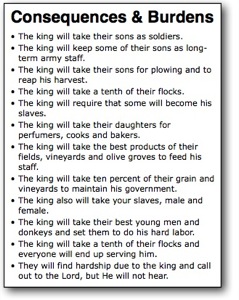
The Compromise for a King
1 Samuel 8:1-22
The Bible Teaching Commentary
Paul J. Bucknell
______________________________________
B. Consequences for One's Choices
1 Samuel 8:9-18
A. Compromise (1-8) | B. Consequences (9-18) | C. Insistent (19-22)
Handout | Bible Study Questions 1 Samuel 8:1-22 | Podcast
We are somewhat surprised by the Lord’s response here. Why does the Lord respond the way He does to His people and just let them go on with their inferior plans?
The Lord’s Response (1 Samuel 8:9)
“Now then, listen to their voice; however, you shall solemnly warn them and tell them of the procedure of the king who will reign over them” (1 Samuel 8:9).
 There are two parts to what He said. First, Samuel is to listen to them, that is, agree to give them a king. Second, he is to warn them of the implications of having a king.
There are two parts to what He said. First, Samuel is to listen to them, that is, agree to give them a king. Second, he is to warn them of the implications of having a king.
Samuel does not start by agreeing to their request but first presents the ramifications of having a king. Samuel does this with the hope that they will turn from their evil.
The Consequences (1 Samuel 8:10-18)
Samuel enumerated the difficulties of having a king.
“So Samuel spoke all the words of the LORD to the people who had asked of him a king. And he said, “This will be the procedure of the king who will reign over you: he will take your sons and place them for himself in his chariots and among his horsemen and they will run before his chariots. “And he will appoint for himself commanders of thousands and of fifties, and some to do his plowing and to reap his harvest and to make his weapons of war and equipment for his chariots.
“He will also take your daughters for perfumers and cooks and bakers. “And he will take the best of your fields and your vineyards and your olive groves, and give them to his servants. “And he will take a tenth of your seed and of your vineyards, and give to his officers and to his servants. “He will also take your male servants and your female servants and your best young men and your donkeys, and use them for his work. “He will take a tenth of your flocks, and you yourselves will become his servants.
“Then you will cry out in that day because of your king whom you have chosen for yourselves, but the LORD will not answer you in that day.” Nevertheless, the people refused to listen to the voice of Samuel, and they said, “No, but there shall be a king over us, that we also may be like all the nations, that our king may judge us and go out before us and fight our battles.” (1 Samuel 8:10-20).
Samuel mentioned many negative implications of having a king. He focused them on the burden a king would be. The list is extensive because Samuel wanted them to turn from their decision.
-
The king will take their sons as soldiers.
-
The king will keep some of their sons as long-term army staff.
-
The king will take their sons for plowing and to reap his harvest.
-
The king will take a tenth of their flocks.
-
The king will require that some will become his slaves.
-
The king will take their daughters for perfumers, cooks and bakers.
-
The king will take the best products of their fields, vineyards and olive groves to feed his staff.
-
The king will take ten percent of their grain and vineyards to maintain his government.
-
The king also will take your slaves, male and female.
-
The king will take their best young men and donkeys and set them to do his hard labor.
-
The king will take a tenth of their flocks and everyone will end up serving him.
-
They will find hardship due to the king and call out to the Lord, but He will not hear.
This is an extraordinary list. One must ask why is it that the people would still insist on having a king.
“Nevertheless, the people refused to listen to the voice of Samuel, and they said, “No, but there shall be a king over us, that we also may be like all the nations, that our king may judge us and go out before us and fight our battles” (1 Samuel 8:19-20).
 They must somehow have thought their solution was better than the cost. This is very similar to what is going on in this world. People are willing to give up their freedom and wealth so to make things better, safer and more prosperous. It is a blind stupor. The costs are not worth it. When people are threatened or just plain lazy, the promises of the governments and organizations just lure them into subservience. There is a better way.
They must somehow have thought their solution was better than the cost. This is very similar to what is going on in this world. People are willing to give up their freedom and wealth so to make things better, safer and more prosperous. It is a blind stupor. The costs are not worth it. When people are threatened or just plain lazy, the promises of the governments and organizations just lure them into subservience. There is a better way.
Samuel was giving them a second chance, but they refused to give heed. What was the reason for all this? It appears that they were so convinced that a king could better protect them from harm and keep their wealth and sense of peace. Samuel boldly told them that they would lose their wealth and family as they knew it.
 Check out our Digital Old Testament Library for a huge collection of resources on 1 Samuel and all of the Old Testament!
Check out our Digital Old Testament Library for a huge collection of resources on 1 Samuel and all of the Old Testament!
Next -> C. Insistent on One's Own Ways (1 Samuel 8:19-22)





